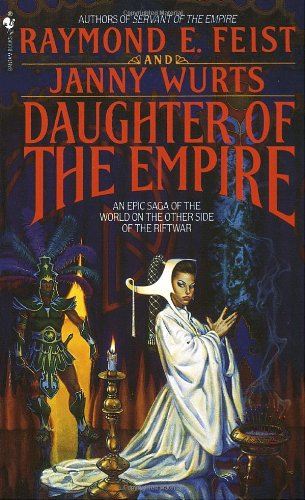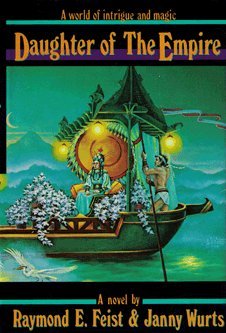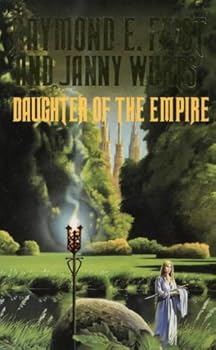
![]() Daughter of the Empire by Raymond E. Feist & Janny Wurts
Daughter of the Empire by Raymond E. Feist & Janny Wurts
THE EMPIRE CYCLE is the second trilogy set in Raymond E. Feist’s (and in this case Janny Wurts’) Riftwar universe. Readers of the RIFTWAR SAGA (the first trilogy by publication date) will know all about the world of Midkemia and its war with the otherworldly Kelewan. Daughter of the Empire (1987) takes place entirely in Kelewan and so offers a new insight into the Riftwar universe, from the other side of the rift. Readers familiar with the earlier works will enjoy spotting the veiled references to familiar events and characters, but these are not central to Daughter of the Empire, which can easily be read as a standalone novel.
The story opens as Mara, the young daughter of a ruling family, is about to be initiated into the service of the goddess Lashima. The ceremony is interrupted as news arrives of the murder of Mara’s father, the Lord of the Acoma, and her brother, the heir to the estate. Mara is now Ruling Lady of the Acoma in a hostile empire of notorious families all vying for power and willing to kill for it. If she wants to restore the Acoma to greatness and exact revenge on her enemies, she must learn to be a leader and to play the Game of the Council with stealth and skill.
Mara’s challenges are great. She must recruit new soldiers and deal with the grey warriors who roam her estate. Then there are the cho-ja, a race of giant insect-like creatures – can Mara secure the protection of their allegiance? Worst of all, she must consider marriage, in a world where men are to be obeyed by subservient wives.
Kelewan is different from the world of Feist’s earlier works in many ways. Daughter of the Empire is set in the Tsuranuanni empire, the inspiration for which is clearly oriental, as manifested in the clothes, the style of buildings and the climate. Also striking is the lack of magic in this first book. Two magicians make a rather sporadic, though important, appearance late in the story, but they are a rare breed. This is for the most part a tale of political wrangling, strategy and war rather than a tale of magical power.
 Feist and Wurst pull off something impressive in the creation of Mara. Despite being only 17 she is a strong character who, against the odds, remains believable. Key to achieving this are the characters surrounding Mara who lend her strength and wisdom: battle hardened Keyoke, loyal Papewaio, childhood nurse Nacoya and the mysterious Arakasi. With their aid Mara develops into a complex character and is surprisingly ruthless, unafraid to see people put to death and unflinching in the use of slave labour. These unpleasantries are presented as pervasive aspects of Tsurani life, in which only the strong survive. I appreciated this ruthless streak. In my experience many authors engineer their stories so that likeable protagonists rise to the top without marring their morals or dirtying hands. Feist and Wurst do not bow to the pressure.
Feist and Wurst pull off something impressive in the creation of Mara. Despite being only 17 she is a strong character who, against the odds, remains believable. Key to achieving this are the characters surrounding Mara who lend her strength and wisdom: battle hardened Keyoke, loyal Papewaio, childhood nurse Nacoya and the mysterious Arakasi. With their aid Mara develops into a complex character and is surprisingly ruthless, unafraid to see people put to death and unflinching in the use of slave labour. These unpleasantries are presented as pervasive aspects of Tsurani life, in which only the strong survive. I appreciated this ruthless streak. In my experience many authors engineer their stories so that likeable protagonists rise to the top without marring their morals or dirtying hands. Feist and Wurst do not bow to the pressure.
There are, however, less believable elements to this story, particularly as a result of the important role that questions of honour play in Tsurani society. Indeed, the unwritten code of behaviour that governs the ruling classes is accepted without question. Sons who publicly insult their fathers must fall on their own swords and loyal servants are condemned to death for very minor offences if honour is at stake. I sometimes wondered if this blind acceptance of seemingly outrageous traditions was being used as an aid to move the plot forward. There were times I was piqued by an erstwhile villain’s sudden willingness to do himself in. Nevertheless, in the interest of a pacey plot I am willing to forgive and forget.
Speaking of pace, this is a story that heats up in the second half and is worth sticking with if you find the start slow. More than once I found myself wondering ‘how is she going to get out of this one?’ and the tension is well built and maintained throughout. Mara often makes plans, the true nature of which are not revealed until their ultimate fruition. This creates a nice sense of mystery and intrigue.
 And yet for a few reasons Daughter of the Empire isn’t a five star read. The setting, which could have been rich and beguiling, gets lost amid the central plot. The speech is often so formal that it can be jarring to read. Yes, Mara must act and talk like a ruling lady, but her pattern of speech remains stilted even in private, and for this reason I could not truly connect with her. Other aspects of the writing style had a tendency to grate, such as when Mara’s “bow was peremptory, and she stepped precipitously through a side screen.”
And yet for a few reasons Daughter of the Empire isn’t a five star read. The setting, which could have been rich and beguiling, gets lost amid the central plot. The speech is often so formal that it can be jarring to read. Yes, Mara must act and talk like a ruling lady, but her pattern of speech remains stilted even in private, and for this reason I could not truly connect with her. Other aspects of the writing style had a tendency to grate, such as when Mara’s “bow was peremptory, and she stepped precipitously through a side screen.”
Another real grievance lay in the fact that several of the male characters, who are otherwise strong and ruthless, become utterly giddy and useless in the presence of beautiful women, risking their lives for a chance at bare flesh. Personally I found this unbelievable. Where are all these highly ambitious men who become so entranced by the mere hint of thigh under a skimpy robe that they are willing to throw themselves to the lions? Perhaps I’m hanging out with the wrong kind of men.
Nevertheless, Daughter of the Empire is an enjoyable read, full of plotting and scheming and riddled with tension. This is a very valuable addition to the RIFTWAR CYCLE and one that offers something a little different from the norm.
~Katie Burton
![]() Finally, an audio version of THE EMPIRE TRILOGY is available (Random House Audio, 2017) and it’s a terrific production. Tania Rodrigues is a perfect choice for narrator. Her voices for both the female and male voices suit the characters well and her pacing is nice.
Finally, an audio version of THE EMPIRE TRILOGY is available (Random House Audio, 2017) and it’s a terrific production. Tania Rodrigues is a perfect choice for narrator. Her voices for both the female and male voices suit the characters well and her pacing is nice.
I totally agree with Katie’s review. Daughter of the Empire is an absorbing story that I enjoyed from beginning to end. It’s packed with a large cast of well-developed characters, a richly-built world, a twisty plot full of political intrigue and physical danger. Mara is an engaging protagonist; she’s clever, courageous, and patient as she schemes, but she’s not a Mary Sue. She takes risks and sometimes makes big mistakes.
I have two critiques that were also mentioned by Katie. I found it a little difficult to believe in Kelewan’s honor code. Mara manages to get herself out of two seemingly impossible situations by manipulating a bad guy with the honor code. Perhaps I just can’t see beyond my Western ideals, but I had a hard time believing these two events as well as some minor plot details involving the code. However, like Katie, I was willing to overlook this because I enjoyed the story so much.
The other is the wordiness which is just a personal peeve of mine since I teach scientific writing and am always exhorting students to “omit needles words.” I tend to edit as I read and can’t help but notice when three words can be replaced by one. However, I know many readers who love the style employed in this series and, though a bit wordy, the language is carefully, precisely (and I’d say even lovingly) used, which I can appreciate. Also, the audiobook narrator’s performance was so smooth and natural that most readers will not pick up on the wordiness.
I enjoyed Daughter of the Empire so much that I immediately picked up the sequel, Servant of the Empire. I’ll let you know about it soon.
~Kat Hooper







Perhaps you are hanging out with the right kind of men!
I think an argument can be made for a society with a rigid code of social position and “honor” that makes the idea of ritual suicide/execution for a minor offense plausible. I think we see examples in history and even in current society — this is an odd simile, I know, but gang mentality often focuses on “disrespect” as a reason to attack another gang or an individual.
That’s actually very true Marion and I definitely understood where the authors were coming from. There certainly are many examples throughout history and in the present day of extreme codes of honour (sorry, stubborn English girl here) being upheld, and of people willing to die for them. I think the reason I felt disbelieving here was because the code applied to everyone equally. From my (admittedly limited) reading of history the rich and powerful are normally pretty unwilling to sacrifice themselves and find someone else to do it for them!
I admit I was being pretty picky :)
Well, I think that sometimes they had to sacrifice themselves. Generally, though, I agree with you — wealthy and powerful people can almost always find a proxy.
How does anyone in this book get anything done if they’re so easily distracted by pretty ladies or eager to sacrifice their lives for honor? I would think those two factors would derail personal ambition fairly quickly!
I know, right?
“I’m the hero, I have great plans fo– oh, hey, gorgeous! How you doi–Ooof! Sorry. Oh, you’re a superior person and I just dishonored myself by stepping on your foot.. Drat.” Falls on sword. Story ends.
Right??
“Gosh, I wish I could get this evil empire started, because I have big plans for subjugating my people, but they have SO MANY pretty daughters!”
Haha you’ve nailed it! It’s definitely a common theme, there do seem to be a lot of pretty daughters in fantasy worlds! Luckily in this book Mara is a bit more concentrated and competent so some decent stuff does get done.
I’m so glad this has been reviewed! Janny has always been a favorite author on our site and she created our beautiful dragon logo. I’ve been wanting to read all her books, but have been hoping for audio formats.
Amazing news! I have lots of plans to read more of her work.
I was just wondering the other day who had drawn that dragon.
It’s great that you are reviewing this book which has probably fallen off a lot of people’s shelves since it was published. I really enjoyed Daughter of the Empire when I read it. Much more than Raymond Feist’s depiction of the same world. In this we can really see the differences between male and female writers, especially in their views of the opposite sex. In Raymond Feist’s Magician, romance does not distract from the aims and ambitions of the protagonists, but the result for me was mechanical and boring. For Janny Wurts, romance and attraction are acknowledged and the protagonist then struggles with her feelings but ultimately tries to do the right thing. Both are probably wrong about reality and the truth is probably somewhere in the middle, but for escapist fantasy, and as a woman, I much prefer Janny Wurts. I just can’t help it!
That’s a neat point, M.T. It’s always fun to look at how different genders approach various issues. Sometimes there is no real difference,and sometimes the differences are dramatic.
I haven’t read the trilogy for twenty years or more but I remember it as one of my favourite fantasy reads.
I am still waiting on the audio version.